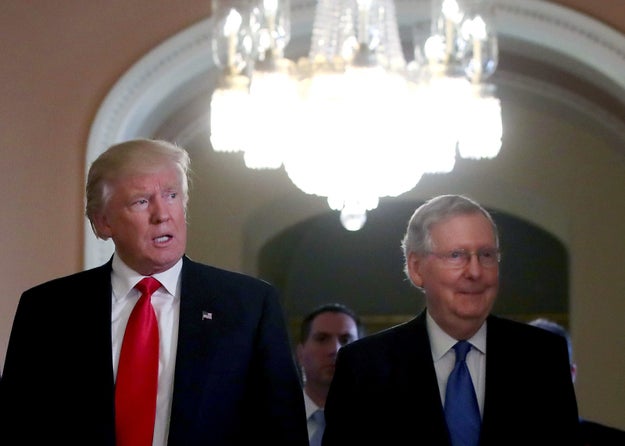[ad_1]

Mark Wilson / Getty Images
WASHINGTON — The Republican Party's effort to repeal Obamacare — and fulfill a promise they've made to American voters repeatedly for seven years — is getting chaotic.
The party's three key leaders gave varying messages on the issue in the span of just a few hours on Tuesday. First, Speaker Paul Ryan said in a morning press conference that their goal was to bring up repealing and replacing the health care law “concurrently” through the process the Senate is setting up. “We already showed people what we believe in, what Obamacare should be replaced with, so we're going to use every tool at our disposal through legislation to regulation to bring [a] replace[ment] concurrent along with repeal so that we can save people from this mess,” he said.
Then, President-elect Donald Trump told The New York Times in an interview he wanted a repeal vote next week and a replacement “very quickly or simultaneously, very shortly thereafter.” Trump's comment seems far removed from what Congress is currently doing: moving forward this week on a budgetary resolution that would set up a repeal bill on Jan. 27, with efforts already underway by five GOP senators to delay that date to March 3.
And Senate Majority Leader Mitch McConnell followed up with only a commitment to the budgetary process for repeal that is in the works for this week, saying “we're working on what comes next.” The Senate will vote Thursday on a resolution to set up the repeal bill and vote. Actual repeal will come later.
Specifically on Trump's timeline of holding a repeal vote next week when Republicans don't even have a bill yet, Utah Sen. Orrin Hatch said that “would be fast, but it's possible.”
Pressed on if that scenario was likely, Hatch laughed.
McConnell declined Tuesday to give a timeline for votes on repealing and replacing the legislation in the Senate and whether replacement will be done simultaneously, drawing contrast with Ryan who — along with other lawmakers — has indicated that some replacement language could be included.
But it's still unclear what that language would be and if the Senate would only need 51 votes to pass the replacement under the budgetary tool Republicans are using or the usual 60 votes that legislation in the Senate typically needs. That latter scenario would mean they'll need Democratic cooperation.
Despite disjointed messaging, McConnell maintained that he, Ryan and Trump were all on the same page. “As I indicated earlier, we'll be working with the president-elect's [Health and Human Services] nominee Tom Price, and he'll be helping us craft a way forward,” he said. “So this is going to be a joint effort between the administration, the House and the Senate to put together the replacement…not in anyway inconsistent.”
Asked if there was a lack of direction on the best path forward on Obamacare, South Carolina GOP Sen. Tim Scott said that the problem was actually the opposite. “I think we have a lot of direction from a lot of people,” he said.
A top Trump ally on Capitol Hill, New York Rep. Chris Collins, acknowledged that “there’s confusion within our conference” on what the president-elect wants on Obamacare. “To me that says he does want Obamacare repealed quickly because there were folks today who didn’t think he did,” Collins said of the Times interview. “So that is helpful. But now as to the replacement piece, weeks not months, weeks not years does leave a whole lot of interpretations.”
Meanwhile, Louisiana GOP Sen. Bill Cassidy — one of the senators pushing for a delay on the repeal vote — told reporters “as I speak to people, they see the wisdom in it” in moving the date from Jan. 27 to March 3.
“Clearly if we go by the 27th of this month, four major elements we need to resolve we don't have time to resolve. Those being: What can Tom Price do? How do we pay for it? What is the blueprint or a pathway forward for repeal — pathway and substance of the bill itself? And does it meet the 50-vote threshold?”
South Carolina Sen. Lindsey Graham clarified that although Republicans aren't entirely sure on path forward, they have “a consensus on what they don't want to do,” he said, listing parts of Obamacare that Republicans want to keep, including allowing adult children to stay on their parents' insurance until they are 26 years old.
With Republicans still figuring out the process and timeframe for repeal and replace, Senate Democrats are going on the offense.
“It's a little like Abbot and Costello,” Senate Minority Leader Chuck Schumer told reporters, comparing the GOP leaders to the comedic duo. “Each of them says, 'We must repeal and replace,' and then says, 'You come up with the plan.'”
Alexis Levinson contributed reporting.
[ad_2]
